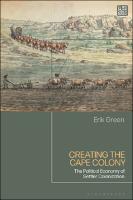Creating the Cape Colony
The Political Economy of Settler Colonization
Abstract
This open access book offers a detailed study of the foundation and expansion of the Dutch Cape Colony to ask why certain regions in the global south became European settler societies from the 16th century onwards. Examining the different factors that led to the creation of the Cape Colony, Erik Green reveals it was a gradual process, made up of ad hoc decisions, in which the agency of indigenous peoples played an important role. He identifies the drivers behind settler expansion, explores the effect of inequality on long-term economic development and examines the relationship between settlers and the colonial authorities, asserting that they should not be treated as one homogenous group with shared economic interests. Assessing specific characteristics of the Cape Colony, such as the proposition it was a slavery economy, and comparing key insights of this study with the historiography of other settler colonies, Creating the Cape Colony demonstrates the need to revise our understanding of how settler economies operated, and to rethink the long-term legacies of settler colonialism. The ebook editions of this book are available open access under a CC BY-NC-ND 3.0 license on bloomsburycollections.com. Open access was funded by The Bank of Sweden Tercentenary Foundation grant.
Keywords
Settler Colonialism; Colonialism; Australasia and Pacific History; InvasionDOI
10.5040/9781350263215ISBN
9781350258259, 9781350258242, 9781350258259Publisher
Bloomsbury AcademicPublisher website
https://www.bloomsbury.com/academic/Publication date and place
London, 2022Imprint
Bloomsbury AcademicClassification
Economic history
Colonialism and imperialism
African history


 Download
Download